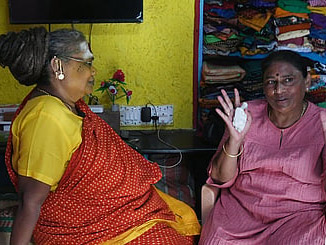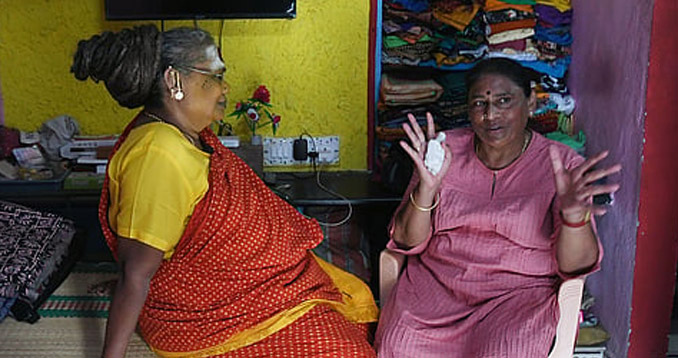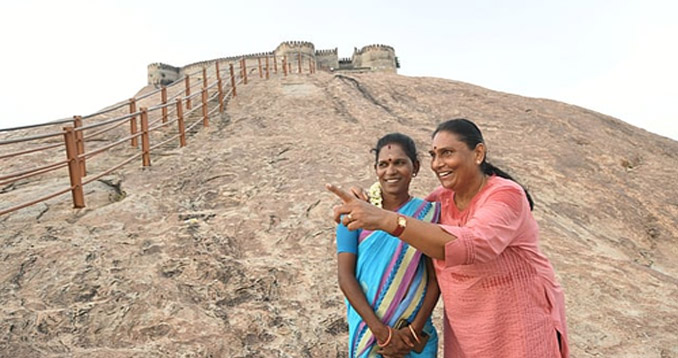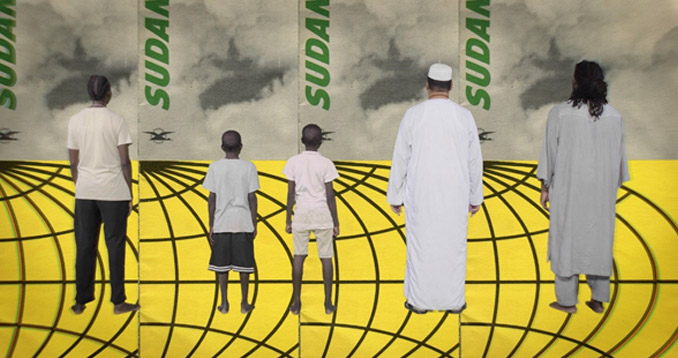

The Vancouver International Film Festival (VIFF), celebrating its 44th year, tells timely stories reflecting current issues facing the world today. Here are a couple of reviews which are an example of the films showing this year from October 2nd to 12th.
I Am Revathi amplifies the voice of a life lived in defiance’
Revathi is a storyteller in P Abhijith’s documentary. At first glance, it is just an ordinary statement. However, as the story unfolds, these words swell with defiance, vulnerability, and dignity — the weight of a lifetime carried in a single line.
Revathi, a transwoman from Tamil Nadu, has weathered rejection, violence, and endless questions on her existence, the act of naming herself is a matter of survival. “When I say I am Revathi, I am telling the world that I exist. They cannot erase me, no matter how hard they try, “she says.
The documentary captures her journey with a rawness that lingers long after the credits roll. But Revathi insists this is not just a film about her — it is a mirror held up to society. “People think they know us, but they only know the stereotypes. My story is not only mine — it is the story of thousands who are never heard.”
Revathi recalls her earliest memories as being filled with confusion. Growing up, she felt different, but there was no vocabulary to explain it. “In school, I was teased. Teachers ignored me. My own family looked at me like I was a mistake,” she says, her words tinged with the exhaustion of recounting wounds that never truly heal.
For years, she lived a double life — one in which she was forced into silence, and another in which she secretly imagined the freedom to be herself. But the world outside, she says, was unforgiving.
“Everywhere, people asked me: Who are you? Are you a man or a woman? Why do you walk like that? Why do you talk like that? I was never allowed to just exist.”
The film’s title, I Am Revathi, resonates deeply with her. She explains that reclaiming her name was an act of resistance. “When I chose the name Revathi, it was like being born again. That name carries my pain, but also my power. It is the name of the person I fought to become.”
Her insistence on identity is echoed in the film’s most powerful sequences, where her voiceover cuts through silence. Abhijith may have framed the film, but Revathi’s words are its heartbeat.
Revathi is frank when asked about Kerala’s supposed progressiveness. “People say Kerala is educated and forward-thinking. But when it comes to transgender people, the same society shuts its eyes. They love to clap for us on stage, but in real life, they don’t want us near them.”
She recalls being denied jobs, harassed in public spaces, and even facing violence at the hands of those who claimed to ‘protect morality’. Her voice hardens: “Do you know what it means to be laughed at every single day? To be thrown out of buses, refused by landlords, insulted in hospitals? People see us as entertainment, not as humans.”
While Abhijith’s direction gives the film structure, Revathi believes its strength is that it does not sensationalise her story. “He didn’t tell me what to say. He didn’t ask me to cry for the camera. He just let me speak. That itself is rare. Usually, others want to speak for us. This time, I spoke for myself.”
Her words expose the paradox of representation. While queer and transgender characters are becoming part of Indian cinema, Revathi argues that most of those roles are mere caricatures. “When films show us only as jokes or tragedies, society believes that is all we are. I wanted this film to break that pattern.”
The film concluded with a long and loud applause, a gesture that visibly moved Revathi. But she remains cautious. “Claps are good but claps alone will not feed us. After the applause, will anyone give us jobs? Will anyone rent us a house? That is the real test.”
Yet, she does not dismiss the importance of festivals like VIFF. “This festival gave me a stage. It gave me visibility. For someone like me, who has spent a lifetime being invisible, that matters.”
Revathi’s resilience is almost unsettling in its clarity. She knows her fight is far from over. “Every day, I have to fight. To walk on the road without fear. To be respected as a worker. To live like any other human being. That fight doesn’t end just because a film was made about me.”
She smiles faintly, then adds: “But the fight also makes me who I am. If I did not resist, I would not be Revathi. I would just be one more existence swallowed by silence”.
One of the dangers that worries Revathi is being reduced to an object of sympathy. “I don’t want people to look at me and say, ‘Oh, poor thing’. I want them to see my strength. To respect me, not pity me. That is why I spoke in this film.”
This distinction, she argues, is crucial in changing attitudes. “Sympathy is temporary. Today they feel sorry, tomorrow they forget. Respect is permanent. That is what we need.”

Revathi believes films can start conversations, but only collective action can bring change. She challenges the audience directly: “Don’t just clap for me in the theatre. Go back home and ask yourself — how do you treat the transperson on your street? Do you include them in your life, or do you avoid them? That answer matters more than any award this film can get.”
Her voice rises as she concludes: “We don’t need charity. We don’t need pity. We need dignity. Give us that, and you will see how much we can contribute to society.”
And it is this power within Revathy that inspired Abhijith to train his lens on her. The director has been closely following the LGBTQIA+ community for the past 18 years through photography, documentaries, and cinema.
“I started in 2007 in Kozhikode by exhibiting my photographs based on the lives of the transgender community. Former minister M K Muneer saw my photographs and asked me about the community. But after our conversation, in 2015, during my next exhibition, he announced that he would implement a transgender policy in Kerala,” Abhijit recalls.
Abhijith also held an exhibition documenting the lives of transmen. And later in 2022, his debut feature film ‘Antharam’ premiered in Kerala. The film portrayed the inner conflicts, warmth, trauma, and joyful moments in the lives of a transwoman, a teenage girl, and a man living under the same roof.
Now, he documents the life of Revathy — an activist, writer, and actor. “I have known her since 2007. I have also read her autobiography, ‘The Truth About Me: A Hijra Life Story’, published by Penguin Books,” he says.
Abhijit felt Revathy was someone who should be documented because, through her story, one can narrate experiences that resonate with the lives of countless transgender people. “Her journey is remarkable,” he adds. From working as a sex worker, becoming an activist, and starting as an office assistant in the NGO Sangam, to eventually becoming its director, leading protests, fighting for transgender rights, and now establishing herself as a writer… “That resilience, I wanted to capture that,” he smiles.
At its core, ‘I Am Revathi’ is not merely a documentary. It is an assertion of being. Revathi’s words, her presence, and her refusal to be erased give the film its soul.

Khartoum tells a tale of war and displacement, reflecting current global situations
Detailing the destructive history and consequences of the ongoing Civil War in Sudan, Khartoum is an incredibly personal documentary that manages two things with resounding success.
Most importantly, directors Anas Saeed, Rawia Alhag, Ibrahim Snoopy Ahmad, Timeea Mohammad Ahmed, and Phil Cox manage to effectively recreate the atmosphere and aesthetics of this deadly warzone through unique, artistic dramatizations featuring real-life figures who tell their stories and displacement with staggering honesty.
This gives the documentary an extremely personal dimension, with these five individuals’ lives serving as a microcosm for the Sudanese as a collective. Secondly, Khartoum also manages to be very pragmatic and educational in its depiction of the facts, offering all the necessary context for those without prior knowledge of the conflict to fully understand the stakes.
Khartoum centers around five individuals who have been forced to evacuate from Sudan following the outbreak of a Civil War between the new civilian government and the existing military forces. The documentary isn’t afraid to go into sickening details about the acts of violence committed by both sides of this conflict, but it’s much less interested in taking a political stance than it is in exploring how the backdrop of this warfare has affected the Sudanese community. Above all, the film is an examination of humanity and how the passage of time can distort our memories of the place we call home.
The film also explores how post colonial divisions have divided different ethnic nationalities not just in Sundan, but most of the world that was colonized.
The Vancouver International is true to its commitment to reflect the stories of reginal struggles including Palestine with films such as Palestine 36 and With Hasan in Gaza.
The VIFF also does not take sponsorship money from corporations that fun the Israeli genocide of Palestine, while other film festival including the Toronto International Film Festival (TIFF), the Vancouver Queer Film Festival (VQFF), International Film Festival of South Asia (IFFSA), International Film Film Festival South Asia (ISAFF) and the Vancouver Asian Film Festival (VAFF) all take funds from corporations that give financial support to the Israeli genocide of Palestine.
